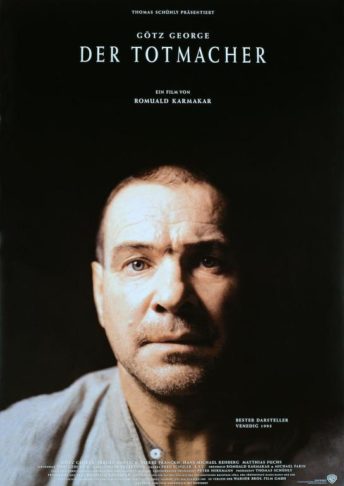 This is one of the nastiest, most unflinching depictions of madness and murder you’ll ever experience, despite the fact that THE DEATHMAKER doesn’t contain a single act of onscreen violence. For that matter, there’s little “action” of any sort, as the whole thing consists of a two character interrogation. But don’t be fooled: this is tough stuff made all the more disturbing by the fact that it’s based entirely on documented facts.
This is one of the nastiest, most unflinching depictions of madness and murder you’ll ever experience, despite the fact that THE DEATHMAKER doesn’t contain a single act of onscreen violence. For that matter, there’s little “action” of any sort, as the whole thing consists of a two character interrogation. But don’t be fooled: this is tough stuff made all the more disturbing by the fact that it’s based entirely on documented facts.
The subject of THE DEATHMAKER (DER TOTMACHER; 1995) is Fritz Haarmann, a meek salesman who in 1924 confessed to murdering 24 young boys. Often described as “the most infamous mass murderer of the 20th Century”, Haarmann was the inspiration for the legendary Peter Lorre role in Fritz Lang’s classic M and the lead character of Uli Lommell’s TENDERNESS OF THE WOLVES. Like those films THE DEATHMAKER was made in Germany, where Haarmann’s name is still a household word, and is easily the most factual of the three, as director Romuald Karmakar (THE HIMMLER PROJECT) based his account directly on Haarmann’s actual psychiatric report from 1924.
Incidentally, the American filmmaker Monte Hellman (of THE SHOOTING and TWO-LANE BLACKTOP) is prominently credited on the ‘03 Anchor Bay DVD release as THE DEATHMAKER’S “Presenter”, but beyond that doesn’t appear to have had anything to do with the production.
In Hanover, Germany of 1924, in a featureless room with bars on the windows, the seemingly happy-go-lucky Fritz Haarmann is interrogated by Professor Ernst Schultze, a dedicated psychiatrist whose task is to determine whether Haarmann is sane enough to stand trial. The charge? Murdering and dismembering 24 young boys, which initially seems the farthest thing from these men’s minds as they discuss Haarmann’s upbringing, his relationships and his sociopolitical attitudes, which don’t seem all that different from those of the majority of his fellow citizens. Schultze tries to broach the subject of Haarmann’s atrocities several times but the latter steadfastly brushes off the subject.
But as the days stretch steadily onward Haarmann’s defenses are worn down; he commences detailing his crimes, to Schultze’s understandable horror. In the same cheerful, breezy tone with which he began the interview, Haarmann describes how he cut open kids’ bodies, severed their penises and then flushed them down toilets, and threw their discarded skins into a local river. Around this time a young boy is brought in to identify Haarmann; the kid was one of his victims who managed to escape. The boy readily identifies Haarmann, who claims not to recognize his accuser.
The interrogation continues, with Haarmann either evading Schultze’s queries or ignoring them outright. Eventually Schultze reveals that in his estimation Haarmann is not insane, so he’s going to recommend the death penalty. Haarmann takes this news with his customary breeziness, although he does show some genuine emotion when the possibility is broached that Schultze, with whom Haarmann has become quite close over the course of the interrogation, might not be back to see him before he’s sent to the gallows.
A 115-minute two-person talkfest might not sound like riveting cinema, but Romuald Karmakar is a canny enough filmmaker to pull it off. Far from simply plopping down a camera and letting the characters speak lines from the actual transcripts, he and cinematographer Fred Schuler utilize roving camerawork subtle enough that it never distracts from the drama.
Obviously it’s the fact-based words spoken by the characters that comprise the film’s action, and Karmaker pays them his utmost respect. He also adds a number of nearly imperceptible touches that one may not notice initially but which add immeasurably to the experience. Note the way he presents the span of the interrogation, which lasted a reported six weeks but is presented here without time demarcations. Nor are there any noisy music cues, with the soundtrack kept admirably–and often unnervingly–restrained throughout. Often Karmakar will choose to hold on a scene for several seconds, as he does in a quiet bit with Schultze in his home pondering the case, but he’s not averse to jump or shock cuts: the young witness to Haarmann’s crimes is introduced via an unexpected cut from Haarmann at the window of the interrogation room to the boy standing at attention several hours (if not days) later. Such elements may not seem like much, but they succeed in imparting a cinematic flow to what in lesser hands might have seemed stuffy and stage-bound.
It’s safe to say that Gotz George as Haarmann delivers what is easily one of the ballsiest performances in movie history, fully immersing himself in the mind and soul of one of the most profoundly evil men of all time. Viewing this nutcase makes for a positively bone-chilling experience that, despite its brilliance, only the most hardened viewers will want to attempt.
Vital Statistics
THE DEATHMAKER (DER TOTMACHER)
Pantera Film GMBH
Director: Romuald Karmaker
Producers: Romuald Karmaker, Thomas Schuhly
Screenplay: Romuald Karmaker, Michael Farin
Cinematography: Fred Schuler
Editing: Peter Przygodda
Cast: Gotz George, Jurgen Hentsch, Pierre Franckh, Hans-Michael Rehberg, Matthias Fuchs
